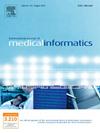SupportPrim CDSS: A clinical decision support system architecture based on microservices for non-specific musculoskeletal disorders
IF 3.7
2区 医学
Q2 COMPUTER SCIENCE, INFORMATION SYSTEMS
International Journal of Medical Informatics
Pub Date : 2025-04-30
DOI:10.1016/j.ijmedinf.2025.105919
引用次数: 0
Abstract
Background and Objective
Non-specific musculoskeletal disorders (MSDs) pose significant challenges in primary care due to ambiguous symptoms and diverse etiologies. This research presents the SupportPrim clinical decision support system (CDSS), an innovative approach that combines case-based reasoning (CBR) with a scalable microservice framework, aiming to improve personalized treatment and clinical decision processes in MSD care.
Methods
The SupportPrim CDSS is engineered using a modular microservice architecture designed for scalability, reliability, and seamless clinical integration. Subjective patient-reported questionnaires and demographic data are processed through an optimized CBR engine that retrieves precedent cases to inform current clinical decisions. The system leverages rigorous evaluation through iterative experiments and a randomized controlled trial (RCT) in Norwegian primary care, thereby assessing its usability, clinical utility, and operational performance.
Results
The system demonstrates high reliability, characterized by negligible downtime and a mean case retrieval response time of 0.18 seconds. Clinicians reported favorable user interactions, emphasizing the system's ability to facilitate shared decision making and personalized care. While the SupportPrim study intentionally maintained a static casebase, the system possesses the ability to incorporate active learning to boost adaptability and precision. Extensive validation and verification from associated studies confirm considerable performance of both the CBR engine and the CDSS.
Conclusion
The SupportPrim CDSS effectively leverages CBR within a microservice-based framework to aid clinicians in delivering evidence-based, personalized patient care for patients with non-specific MSDs. Its robust design, coupled with comprehensive verification and validation across multiple associated studies, underscores its potential for broader healthcare applications and improved clinical decision support.

SupportPrim CDSS:基于微服务的非特异性肌肉骨骼疾病临床决策支持系统架构
背景与目的非特异性肌肉骨骼疾病(MSDs)由于症状不明确和病因多样,对初级保健提出了重大挑战。本研究提出了SupportPrim临床决策支持系统(CDSS),这是一种将基于案例的推理(CBR)与可扩展的微服务框架相结合的创新方法,旨在改善MSD护理的个性化治疗和临床决策过程。方法SupportPrim CDSS采用模块化微服务架构设计,具有可扩展性、可靠性和无缝临床集成的特点。主观的患者报告问卷和人口统计数据通过优化的CBR引擎进行处理,该引擎检索先例病例,为当前的临床决策提供信息。该系统通过反复实验和挪威初级保健的随机对照试验(RCT)进行严格的评估,从而评估其可用性、临床效用和操作性能。结果系统可靠性高,停机时间可忽略不计,平均病例检索响应时间为0.18秒。临床医生报告了良好的用户交互,强调了系统促进共享决策和个性化护理的能力。虽然SupportPrim的研究故意维持了一个静态的案例库,但该系统具有结合主动学习的能力,以提高适应性和准确性。相关研究的广泛验证和验证证实了CBR发动机和CDSS的相当大的性能。结论:SupportPrim CDSS在基于微服务的框架内有效地利用了CBR,帮助临床医生为非特异性msd患者提供基于证据的个性化患者护理。其强大的设计,加上多个相关研究的全面验证和验证,强调了其在更广泛的医疗保健应用和改进的临床决策支持方面的潜力。
本文章由计算机程序翻译,如有差异,请以英文原文为准。
求助全文
约1分钟内获得全文
求助全文
来源期刊

International Journal of Medical Informatics
医学-计算机:信息系统
CiteScore
8.90
自引率
4.10%
发文量
217
审稿时长
42 days
期刊介绍:
International Journal of Medical Informatics provides an international medium for dissemination of original results and interpretative reviews concerning the field of medical informatics. The Journal emphasizes the evaluation of systems in healthcare settings.
The scope of journal covers:
Information systems, including national or international registration systems, hospital information systems, departmental and/or physician''s office systems, document handling systems, electronic medical record systems, standardization, systems integration etc.;
Computer-aided medical decision support systems using heuristic, algorithmic and/or statistical methods as exemplified in decision theory, protocol development, artificial intelligence, etc.
Educational computer based programs pertaining to medical informatics or medicine in general;
Organizational, economic, social, clinical impact, ethical and cost-benefit aspects of IT applications in health care.
 求助内容:
求助内容: 应助结果提醒方式:
应助结果提醒方式:


